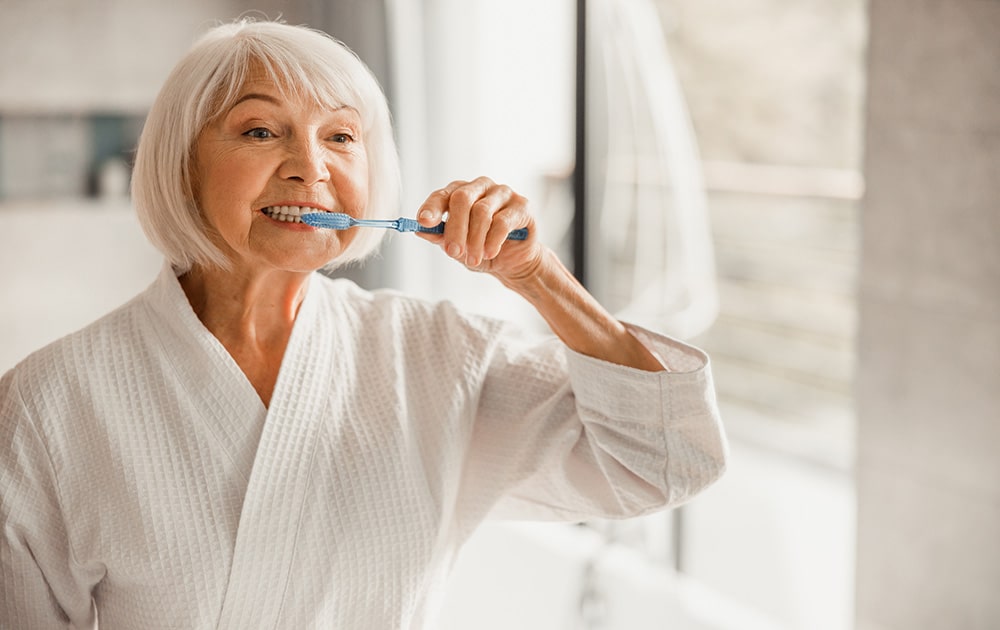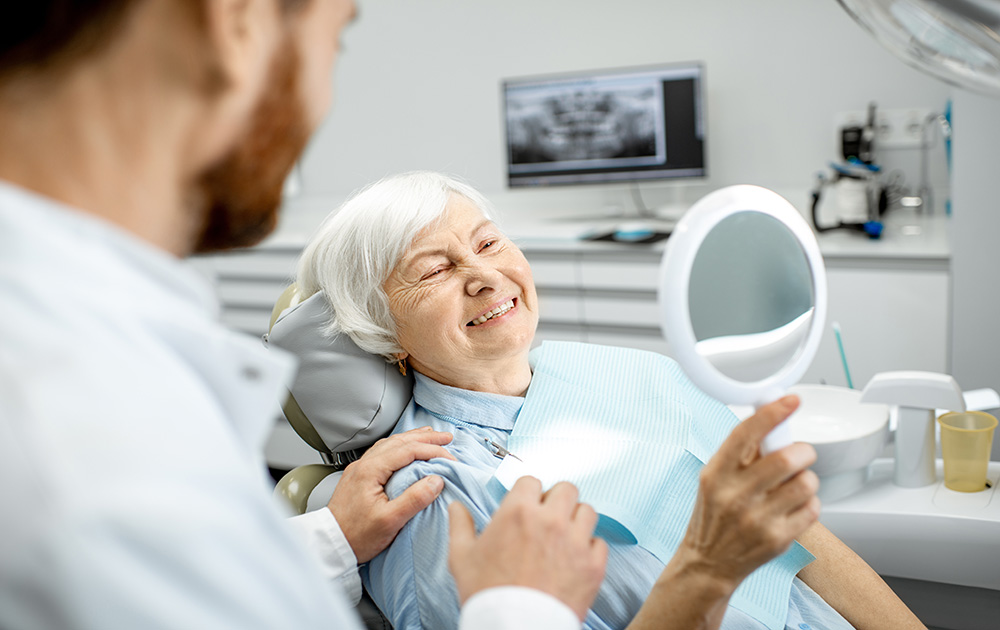
Osteoporosis Meds: Reducing the Risk of Pain and Fractures in Seniors
April 5, 2022
Moving Parents into Assisted Living: 7 Steps for an Easy Transition
April 11, 2022Dental Care for the Elderly: Why it’s Important and Tips for Success
Table of contents
- Why is oral care important in the elderly?
- Common dental problems for seniors
- Oral hygiene tips for seniors
- Oral hygiene for the elderly with no teeth
- Dental care for seniors on Medicare
Your oral health affects every part of your life. Just think about how bothersome it is to do any of your favorite activities when you have a toothache.
It can be even harder to keep up with a dental hygiene routine as you age. For instance, access to care, other health issues, and cognitive decline can all interfere with the dental health of seniors.
On average, seniors 65 and older have at least nine decayed or missing teeth. This can put them at risk for poor nutrition, problems communicating, and infection.
That’s why dental care for the elderly is so important. To help you help your parent, here are some tips for assisting seniors to complete their daily oral care routine.

Why is oral care important in the elderly?
Oral health is essential for everyone! Medical research increasingly shows that the health of your mouth is connected to the health of the rest of your body. Links have been found between poor dental health (especially gum disease) with illnesses such as diabetes, heart disease, and stroke.
Dental care for the elderly is even more critical because seniors are more likely to have underlying chronic illnesses, take multiple medications, and have barriers to accessing appropriate dental care.
Among adults over 65 years of age:
- 1 in 5 has untreated tooth decay
- 2 in 3 have gum disease
- Nearly 1 in 5 have lost all of their teeth
When seniors don’t get the dental care they need, they could experience pain, not get enough nutrition, and have trouble communicating.
Common dental problems for seniors
Age can put seniors at risk for a variety of oral health problems. For example, these might include:
- Dry mouth
- Loss of taste
- Tooth decay
- Gum disease
- Tooth loss
- Darkened teeth
- Bone loss in the jaw
- Poor-fitting dentures
- Thrush (a fungal infection in the mouth)
Seniors with cognitive impairments such as dementia are at increased risk for oral health troubles. They may have difficulty carrying out home oral care routines. Home dental care for elderly adults with dementia should also include education and assistance from their caregivers. This can help prevent cavities, gum disease, and infections.
Oral hygiene tips for seniors
Daily mouth care is essential for good oral health. Plaque can build up quickly when oral care is neglected, leading to tooth decay and gum disease.
The basic recommendations for dental care for the elderly as the same as for any adult:
- Brush at least twice per day
- Floss at least once per day
- Rinse with an antiseptic mouthwash once or twice a day
- Visit a dentist every six months for a cleaning and oral exam
Getting a regular oral exam allows your dentist to diagnose dental diseases or oral cancer early when they’re easier to treat. If your parent experiences sudden changes in taste or smell or has pain, make sure to schedule an appointment with a dentist to rule out more serious health issues.
Dental care tips for seniors with cognitive issues
Older adults with cognitive problems may have trouble communicating with the dentist during appointments or with a caregiver during daily care. Here are some tips to make dental care easier when your loved one has cognitive issues:
- Minimize the amount of noise and distractions
- Have a trusted caregiver attend appointments or provide oral care
- Approach your loved one from the front at eye level and use positive nonverbal communication (smile and make eye contact)
- Keep instructions short and simple
- Keep the oral care routine as consistent as possible
- Using an electric or battery-powered toothbrush may help
Dental care tips for seniors with hearing loss
The American Dental Association offers the following tips for communicating about dental care with people with hearing loss or hearing aids:
- Get your loved one’s attention with a light touch or signal
- Speak slowly, clearly, and loudly (but be careful not to sound patronizing)
- If your loved one can lip read, speak at eye level with your mouth visible
- Minimize background noises
- Written or illustrated instructions can be used
Dental care tips for seniors with vision loss
Vision loss can make it more difficult for your parent to navigate the bathroom and obtain supplies needed for oral care. Some ways that you can help them include:
- Good lighting in the bathroom area with spot/task lighting at the sink if needed
- Large print labels on toiletries
- Keeping toiletries in the same location at all times
- Using contrasting colors to help differentiate items
Dental care tips for seniors with mobility issues
Pain in the hands, fingers, elbows, shoulders, or neck from arthritis or other medical conditions can affect your loved one’s ability to maintain an oral care routine at home. Ways you can assist them include:
- Using an electronic or battery-operated toothbrush with a wide, easy-to-grip handle
- Using a modified toothbrush handle (for example, with a velcro strap or a modified grip)
- Use floss holders to make it easier to clean between teeth
Oral hygiene for the elderly with no teeth
Even if your loved one doesn’t have teeth, they still need to brush. Without the protection of teeth, gums are directly exposed to food and bacteria.
Gently brushing the mouth’s surfaces such as the tongue and gums with a soft toothbrush removes plaque and helps to increase blood circulation to the tissues in the mouth. They should rinse with clean water after brushing. If your parent’s mouth is sensitive, they can also gently use a washcloth to wipe away plaque.
Dentures can increase the risk of infections if not properly cleaned and cared for. In addition to a regular oral care routine, the following steps should be added for denture wearers:
- Rinse the denture under running water after meals to remove food debris
- Rinse with mouthwash or salt water after meals to remove food particles from the mouth
- Brush dentures once a day with a soft toothbrush and denture-friendly toothpaste
- Avoid using whitening toothpaste or any other abrasive products that could scratch dentures (causing stains and trapping bacteria)
- Take dentures out at the end of the day and soak them in an overnight cleanser such as Efferdent
Proper cleaning can help prevent bad breath, gum disease, and damage to the dentures.
Occasionally, denture wearers may use specially made adhesives to keep dentures in place. Your parent’s dentist can recommend the best adhesive for their situation. These shouldn’t be used long term, however. Long-term use of denture adhesives can contribute to a build-up of zinc in the body which can cause health issues.
If your parent uses adhesives regularly, the problem may be that their dentures are ill-fitting. Consequently, they may need to be relined or replaced by a dentist to prevent sores from developing.
Dental care for seniors on Medicare

Finances are a common barrier to getting proper dental care for the elderly. Most older Americans lose dental insurance when they retire, and, unfortunately, Medicare doesn’t cover most routine dental care such as cleanings, fillings, or dentures.
There are some exceptions to this. Medicare might provide coverage for:
- The extraction of teeth to prepare the jaw for radiation therapy
- An oral exam as part of the workup before a kidney transplant or heart valve replacement
- A hospital stay for an emergency or complicated dental procedure
It’s important to know that while Medicare might cover the initial dental services in some cases, they will not pay for follow-up care after the initial treatment.
So how do you help your parent get the dental care they need? There are a couple of options:
Medicaid: If your parent has a low income, they might be eligible for both Medicare and Medicaid. Medicaid programs vary by state, but some offer free or low-cost dental care for seniors. Contact your parent’s state office to find out.
Medicare Advantage: Some Medicare Advantage (Part C) plans offer benefits that Original Medicare does not, including dental coverage. You’ll still need to check with your parent’s plan to see which preventative care and advanced procedures are covered.
Medigap insurance: Most medicare supplement (Medigap) insurance plans don’t cover dental health care; however, a few Plan G options might offer dental coverage as an additional benefit.
Private dental insurance: Similar to how self-employed people can buy health insurance, you can also purchase individual dental plans. These can be found online, through a local insurance broker, or sometimes through your state’s health insurance exchange.
Cash pay: Some dental providers offer discounts for patients who pay with cash. Also, if you live near a dental college, they often have low-cost dental clinics open to the public.
We’re here to help
With home care aides who can assist with oral care routines and transportation services to get them to dental appointments, Parentis Health can help you keep up with your loved one’s dental care needs. Contact us today to see how our coordinated care services can help your parent.

